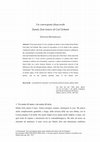Books by Stefano Pietropaoli
Schmitt
"Siamo consapevoli che la scienza giuridica è un fenomeno specificamente europeo. Essa non è solo... more "Siamo consapevoli che la scienza giuridica è un fenomeno specificamente europeo. Essa non è solo saggezza pratica, né unicamente tecnica. È profondamente coinvolta nell’avventura del razionalismo occidentale. In quanto spirito, discende da nobili genitori. Il padre è il rinato diritto romano, la madre la Chiesa di Roma. La separazione dalla madre si compì all’epoca delle guerre civili di religione. La figlia scelse di stare con il padre, il diritto romano, e abbandonò la dimora materna. Cercò una nuova casa, e la trovò nello Stato."

Abolire o limitare la guerra? Una ricerca di filosofia del diritto internazionale
"Può il diritto limitare la violenza della guerra? È possibile regolare giuridicamente l’avvio, l... more "Può il diritto limitare la violenza della guerra? È possibile regolare giuridicamente l’avvio, la condotta e la conclusione di un conflitto armato? Il desiderio di “abolire” la guerra sul piano giuridico è espressione di un’utopia irenista? Oppure non è altro che la pretesa di trasformare la guerra in un’azione di polizia internazionale, illimitata e discriminante, contro un nemico dell’umanità?
A queste domande, la cui attualità è ribadita dalla escalation di conflitti armati degli ultimi anni, il volume risponde mediante una ricostruzione delle proposte teoriche che hanno segnato la storia del rapporto tra guerra e diritto, dalla elaborazione del diritto bellico romano alla dottrina della guerra giusta medievale, fino all’esperienza del diritto internazionale classico della prima età moderna e al suo tragico epilogo con il primo conflitto mondiale."
(Carl Schmitt) Il concetto discriminatorio di guerra
Papers by Stefano Pietropaoli
La posta in gioco
Il corvo bianco
Processi a Carl Schmitt. Questione di dettagli
Cyberspazio. Ultima frontiera dell’inimicizia? Guerre, nemici e pirati nel tempo della rivoluzione digitale
Caesar Dominus et Supra Grammaticam. Il Problema Della Definizione Giuridica Della Guerra
Annotazione dei testi, in C. Biagioli (a cura di), Modelli funzionali delle leggi. Verso testi legislativi autoesplicativi, European Press Academic Publishing, Firenze 2009, pp. 237-270
Human Right to Democracy? Diritti umani, democrazia e ordine mondiale
Se i concetti di democrazia, di diritti umani e di pace internazionale han- no giocato un ruolo i... more Se i concetti di democrazia, di diritti umani e di pace internazionale han- no giocato un ruolo importante nel processo di decolonizzazione, nella delegittimazione dell’apartheid e nella limitazione della violenza tra gli Stati, occorre tuttavia interrogarsi tanto sulla fragilità di questi successi quanto sulla persistenza dei molti insuccessi della ‘comunità internazio- nale’ contemporanea: una comunità assai meno democratica, rispettosa dei diritti umani e pacifica di quanto troppo spesso si racconta
Recensione Del Volume Carl Schmitt Land Und Meer Eine Weltgeschichtliche Betrachtung Reclam Leipzig 1942 Trad It Terra e Mare Milano Adelphi 2002 Isbn 88 459 1743 6

Università degli studi Firenze, 2021
From many points of view, perhaps no author is more distant from Danilo Zolo than Carl Schmitt. B... more From many points of view, perhaps no author is more distant from Danilo Zolo than Carl Schmitt. But a point of convergence is to be found in the common "(political) realism" and in the consequent rejection of irenistic positions confident in the cosmopolitan overcoming of the sovereignty of national states. Zolo and Schmitt thus find themselves on the same side of the fence: both contest the Kantian idea of a civitas maxima, rejecting the prospect of a global order which, claiming to embrace all of humanity, expresses a radical neutralization of politics, based either on a naïve irenistic illusion, or on the hypocritical removal of the differences that run through human cultures, with their fears, their hostilities, their irrationality. This common position is thus a radical critique of the universal doctrine of human rights, of the natural law rhetoric of the moral character of the human person, and of the asserted spiritual unity of the human race.
Juan Ginés de Sepúlveda: un profilo biobibliografico

Defining evil. The war of aggression and international law
"Keywords: Law of war, aggression, outlawry of war, jus publicum europaeum, just war. Ju... more "Keywords: Law of war, aggression, outlawry of war, jus publicum europaeum, just war. Jus publicum europaeum developed rules and institutions serving the law of war. The completion of the process was the so called “classical law of war” of the nineteenth century. The theoretical grounding of this law was the right of sovereign States to wage war. The ‘justice’ of wars was a legally irrelevant problem to the classical law of war. War was conceived as a procedure provided by international law for the enforcement of legally protected claims and interests. The end of the First World War constituted the end of the epoch of “classical international law”. The new international law differed from the previous one in several fundamental aspects, but the most significant difference involved the theoretical development of a ‘discriminatory’ concept of war. The abandonment of the sovereign right of war through the procedural provisions of the Covenant of the League of Nations would bring about a certain limitation of war. Afterwards, the Kellogg-Briand Pact qualified war as an illegal act. In the theological medieval tradition (that was characterized by a discriminatory concept of war), justum could be an attribute both of bellum difensivum and of bellum offensivum. After 1919, American, British and French scholars of international law worked out a new just war theory, equating the ‘just war’ with the defensive war and, at the same time, the ‘unjust war’ with the aggressive war. War became either a serious violation of international law, or an act of punishment directed against aggressors who, as outlaws, didn’t deserve observance of the rules of war. The Covenant of the League of Nations, though concerning the sanction of international crimes, failed to establish a comprehensive prohibition of “aggression”. In 1924, the Geneva Protocol was a new effort to develop international law in the direction of a general prohibition of aggressive war, but it failed because it was linked to an utopian plan for general disarmament. The Kellogg-Briand Pact, concluded in Paris in 1928, condemned recourse to war for the solution of international controversies, but did not set out a general renunciation of war as a means of coercively enforcing international law. Moreover, the right to wage war of self-defence was recognized through an exchange of notes between the signatories of the Pact. On top of that, in the text of the Pact there was no definition of the notion of “aggression”. Within the framework of the conventions concluded from URSS with a series of States in 1933, the famous proposal of Nicolas Politis to define aggression didn’t have any real success. The failure of all these efforts shows that uncertainty and vagueness marked the instruments of law enforcement created by postclassical international law. The ‘outlawry of war’ inflicted serious damage upon the authority of international law, producing the negative effect that States no longer made formal declarations of war nor formally proclaimed the state of war. Large-scale armed conflicts took place in the guise of peaceful measures of ‘self-defence’ or ‘reprisal’, depriving these concepts belonging to the jus publicum europaeum of their legal rigorous content. The most important conquest of classical international law, the ‘hedging’ of war, became a caricature. International lawyers, in the main, focused their attention on the so called jus ad bellum, ignoring the jus in bello and removing the fundamental principle of the equality of the legal position of all belligerents. The trend toward a discriminatory concept of war was resumed and more intensely discussed after 1945. But neither the Charter of UN, neither the bulk of the subsequent treaties, nor the activities of several U.N. Special Committees led to a shared definition of “aggression”. The judges of the tribunal established in Nuremberg to try the leaders of the Third Reich for “crimes against peace”, had to derive the international criminal responsibility for the preparation, planning and commencement of an aggressive war from the Kellogg-Briand Pact, namely a treaty that couldn’t serve as a real authoritative legal basis. According to the judgment of the IMT of Nuremberg, to initiate a war of aggression was not only an international crime: it was “the supreme international crime differing only from other war crimes in that it contains within itself the accumulated evil of the whole”. Nowadays, the “supreme international crime” is still waiting for a consensual definition. The main purpose of the present research is to investigate the historical and theoretical reasons of this lack and envisage the possible solutions. Our analysis will look for some alternative answers to the problem: for instance, the definition of the crime of aggression to be added to the Statute of the ICC; the reform of the United Nations, with particular reference to the role of the Security Council in determining whether an act of…
Carl Schmitt: Uma Introducao
Recensione a Carl Schmitt, Frieden oder Pazifismus? Arbeiten zum Völkerrecht und zur internationalen Politik 1924-1978, Berlin, Duncker & Humblot, 2005, pp. 1010, ISBN 3-428-08940-5
Recensione a Alessandro Bianchi, Al servizio del principe. Diplomazia e corte nel ducato di Mantova (1665-1708)

We are experiencing a digital revolution that is changing the very nature of law. Digital code be... more We are experiencing a digital revolution that is changing the very nature of law. Digital code becomes a form of regulation through which private actors link their values to technological artifacts that prove capable of conditioning their operations both on a material and moral level. But technological artifacts appear to be non-neutral means, reflecting choices of different nature, among which those of a political nature stand out. The more the regulatory provisions are implemented through the use of technologies, the more the codes acquire the status of a regulatory technique, which can be used both to define and incorporate regulatory and contractual provisions into codes both to implement them. The impact of the algorithm is of crystal clear relevance not only in regulation but also in the other side of the coin: surveillance. Each new option brought by the development of technology brings new possibilitiesand changes the way humans relate to each other. All these beautiful tech...
La rete non dimentica. Una riflessione sul diritto all'oblio
Uploads
Books by Stefano Pietropaoli
A queste domande, la cui attualità è ribadita dalla escalation di conflitti armati degli ultimi anni, il volume risponde mediante una ricostruzione delle proposte teoriche che hanno segnato la storia del rapporto tra guerra e diritto, dalla elaborazione del diritto bellico romano alla dottrina della guerra giusta medievale, fino all’esperienza del diritto internazionale classico della prima età moderna e al suo tragico epilogo con il primo conflitto mondiale."
Papers by Stefano Pietropaoli
A queste domande, la cui attualità è ribadita dalla escalation di conflitti armati degli ultimi anni, il volume risponde mediante una ricostruzione delle proposte teoriche che hanno segnato la storia del rapporto tra guerra e diritto, dalla elaborazione del diritto bellico romano alla dottrina della guerra giusta medievale, fino all’esperienza del diritto internazionale classico della prima età moderna e al suo tragico epilogo con il primo conflitto mondiale."